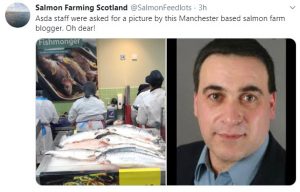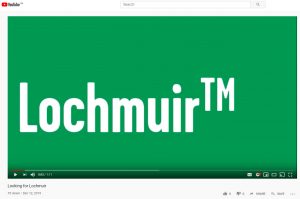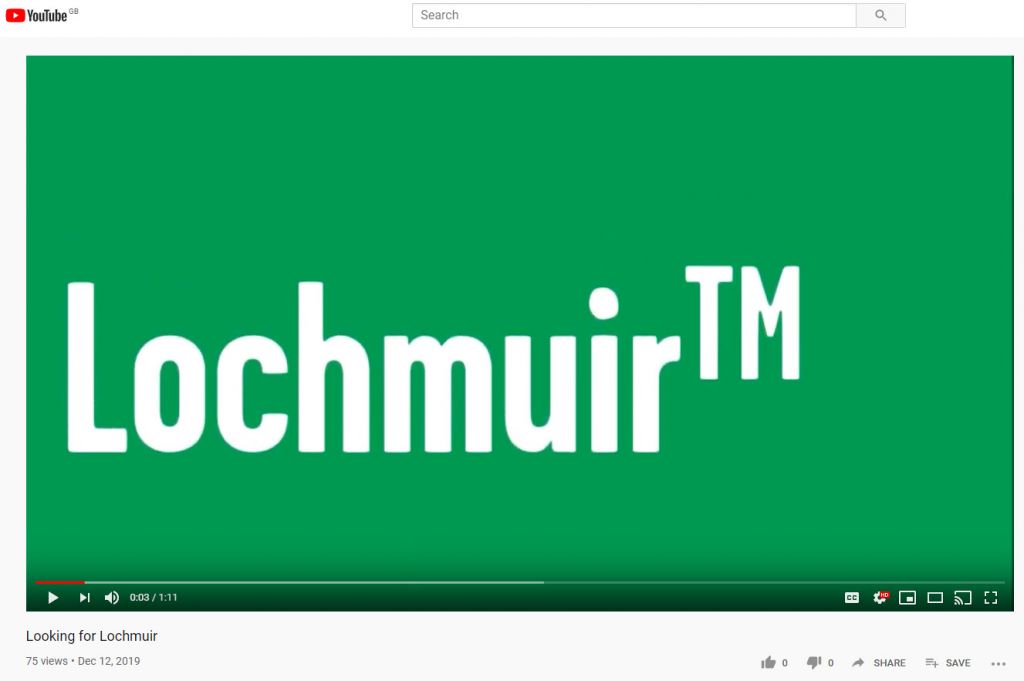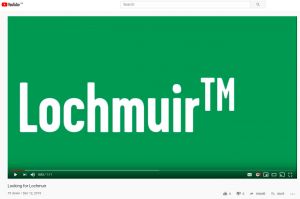Slim pickings: The Courier newspaper reports that the Chairman of the River Tay Salmon Fisheries Board has called on anglers to voluntarily return all the salmon they catch in order to help replenish the number of fish in the river. Although the Board held their annual general meeting in mid-December, it seems that the number of fish caught by anglers during 2109 is not yet available and is unlikely to be so until well into 2020. If this was the salmon farming industry, it would be considered extremely unacceptable to suffer this sort of delay, but the wild sector seems to consider such rules do not apply to them. However, the number of fish caught must be still down on previous years because of the request to return all fish rather than keep one for the pot.
The more interesting aspect of this request to voluntarily return all fish caught to the river is that the Board had asked all the river proprietors for their views and in a vote 52% supported mandatory catch and release. The Chairman told the Courier that the Board did not opt to ask the Scottish Government to make catch and release mandatory because of the slim majority and therefore the decision by any angler to return fish remains voluntary. The Chairman said that with just over half the proprietors being in favour of mandatory catch and release we felt we didn’t have a strong enough mandate.
Why this is interesting is that the UK voted to leave the EU with a vote of about 52% and this was considered enough of a mandate to force through Brexit. Fifty two percent is a majority and sufficient reason to enforce mandatory catch and release on the River Tay. Sadly, the only reason why proprietors would vote against mandatory catch and release is to put profits first. There is a view that unless anglers can take a fish home, they won’t come fishing and fewer anglers would hit proprietors’ incomes.
Other than reports in the local press, there has been little comment about the decision to ask for all fish to be returned into what is Scotland’s largest river. If the River Tay is suffering from continued reduced catches, then the situation for wild salmon must be bad across all of Scotland. It is therefore strange that the sector’s major conservation organisation, Salmon & Trout Conservation have remained extremely quiet about the situation on the Tay although their Communication Consultant, who runs a fish guiding business for anglers on one of the tributaries of the Tay continues to deflect attention away from the problems of east coast rivers by continuing to attack the salmon farming industry. There is of course no salmon farming anywhere near the Tay.
The new fishing season on the Tay begins on the 15th January. It seems that the fish won’t get much of a chance to recover.
Feed the world: The day after the River Tay Salmon Fishery Board AGM, Andrew Graham Stewart of Salmon & Trout Conservation posted a commentary on their website. However rather than express concerns that many River Tay proprietors seem to be putting profits before conserving wild salmon, Mr Graham Stewart stuck to his preferred narrative about salmon farming, even though if salmon farming has any impact on wild stocks it is on less than 10% of the Scottish catch.
This time, Mr Graham Stewart has picked up on the words of the Fisheries Minister Fergus Ewing as he spoke to the Scottish Parliament’s Rural Economy Committee. According to Mr Graham Stewart, Mr Ewing said ‘ If we have to feed twice as big a population in the world, we must, as no new farmland is going to be created any time soon, find a way of using the marine environment … to feed the planet’.
Mr Graham Stewart is extremely irritated by the use of the words ‘feed the planet’ saying that salmon farming is never going to be a sustainable answer to feeding the world but then Mr Ewing never said that it was. The problem with salmon farming critics such as Mr Graham Stewart is that they are so focused on their own agenda of blaming salmon farming for the decline in wild stocks, that they fail to appreciate the significance of the views of others.
It has never been suggested that salmon farming is the solution to feeding more people, but aquaculture certainly is. Already the world eats more aquaculture produce than is caught from the wild and rightly so. In every other area of food production, man has turned from hunter gathering to agriculture and aquaculture is no different. Mr Ewing points out that the human race needs to find more ways to use the marine environment as a way of producing food. Salmon farming is not that solution, but it can help in seeking new solutions and for the record, those solutions do not include moving to land based closed containment.
Mr Graham Stewart pursues his view on salmon farming by repeating that it is not an efficient use of fish protein. He argues that salmon farming requires considerably more bait or other fish to produce a kilo of farmed salmon. Mr Graham Stewarts choice of words is revealing. The fish used in fish meal is usually described as forage fish. These fast reproducing fish were harvested for fishmeal as a food and as a fertiliser for many years before the development of modern fish farming without any complaints from people like Mr Graham Stewart. His terminology of bait fish refers to the fact that small fish are used as bait by anglers to attract large game fish such as salmon.
Mr Graham Stewart says that such fish are extracted by foreign flagged fish from the coastal seas off poor countries in West Africa and South America, depriving local communities of sustenance. Yet, despite a catch of over 5 million tonnes of anchoveta from Peruvian waters, the Peruvian Government found that local consumption could not be grown beyond 200,000 tonnes. This is because these fish do not make great eating. Mr Graham Stewart is of a wider NGO community focusing on aquaculture but who ignore use of wild fish in terrestrial farming and of course pet food. We would certainly be much more impressed if these NGO’s actually tried to persuade consumers to eat these fish by setting up supply chains and finding retail outlets. There are plenty of local species that fall into the same category that they could target but their concern doesn’t seem to extend to taking action.
Whilst on the subject of bait fish, Mr Graham Stewart’s colleague in Salmon & Trout Conservation raise the issue of the use of cleaner fish such as wrasse. Interestingly, the wild fish sector never seemed interested when these fish were caught and killed for bait in lobster pots. It is only when salmon farms started to use them that any indignant outcry was heard.
Mr Graham Stewart states that salmon is not a cheap protein that is a solution to world hunger, and it is simply fatuous for any politician or indeed industry spin doctor to suggest that it is the case. As already mentioned, no-one is suggesting that salmon is the solution but equally, Mr Graham Stewart says that salmon is often considered a luxury food. He says that as he writes salmon is retailing at £15/kg, generally more than cod or haddock and far more than the likes of mackerel or herring.
Most retailers operate a different price point to others so direct comparison is not always simple. This is apparent when comparing other proteins such as sirloin steak. As Mr Graham Stewart’s colleague has focused previously on prices in M&S, we will follow his example. It is worth pointing out that there is also a difference between fillet and loin in that fillets often include the less meaty belly flaps. Salmon is not usually sold with this, so the cuts are more comparable to loin.
In M&S, salmon fillet is currently priced at £16.66/kg
Cod fillet £17/kg
Cod loin £22.50/kg
Haddock fillet £17/kg
Haddock loin £20.49/kg
Mackerel fillet £18/kg
If salmon is a luxury food, then we are not sure what this makes these other species. Of course, the much lower value fish such as ling, whiting and coley are rarely available in UK supermarkets simply because consumers don’t want to eat them. Getting them to eat Norwegian pout or Blue whiting is likely to be a step too far, but we, at Callander McDowell would be happy to help Mr Graham Stewart if he wanted to give it a try.
Finally, Mr Graham Stewart says that hardly a week goes by without further damning evidence of what an environmental disaster open cage farming is. He says that people like us at Callander McDowell are increasingly desperate in their search for valid reasons to vindicate the trashing of our coastal marine environment. In fact, he cannot be further from the truth. The reasons for growing salmon are as good as they were in 1967 when Unilever first put smolts to sea. Of course, the industry has suffered problems but no more than other types of farming and certainly, there is little evidence to suggest that salmon farming has trashed the marine environment. Perhaps, Mr Graham Stewart would like to be more specific.
He says that salmon farming is responsible for the catastrophic decline in those species that depend on clean chemical-free and parasite-free waters. He doesn’t actually say which species, but we are sure he means salmon and sea trout.
Given the current low number of salmon caught from the east coast rivers, we would suggest that salmon farming is not the culprit. The rivers, Tay, Tweed, Spey and Dee must have clean chemical- free and parasite-free waters because there is no salmon farming to be found within hundreds of miles, yet these catches are in catastrophic decline. Who would have thought that anglers fishing the mighty Tay are to be asked to return every fish to the river to help safeguard stocks, but this is now what is happening?
Perhaps Mr Graham Stewart would like to reflect on the fact that his angling colleagues have killed over 5.9 million fish since 1952. These are all adult fish that returned to Scottish rivers to breed and were caught and killed before being able to do so.
Ireland: Its not often that the media publishes an article with a more balanced view of salmon farming. Stephen Collins writing in the Irish Times asks, ‘whatever happened to the Irish salmon farming industry?’ We think it is worth a read and needs no comment:
https://www.irishtimes.com/opinion/what-ever-happened-to-the-irish-salmon-farming-industry-1.4123596
However, there is one small paragraph that is worth repeating here:
“The negative image of the industry is down to some of the early teething problems but primarily because of the campaign of opposition by angling interests, most of whose objections have been shown to be scientifically baseless.”
How true.
Continue to grouse: The long awaited ‘Werrity’ report on grouse moorland was published this month. The animal cruelty charity ‘OneKind’ tweeted that the report is disappointingly light on animal welfare, and they urge the Scottish Government to take action to protect Scotland’s wild animals. ‘OneKind’ seem immune to the fact that they have got into bed with angler’s representatives Salmon & Trout Conservation, whose Communication Consultant has admitted that angling is inherently cruel. We are still waiting to hear back from ‘OneKind’ as to why they have ignored the plight of Scotland’s wild salmon.
Interestingly, we had expected Salmon & Trout Conservation or their Communication Consultant to make some form of comment about their relationship with ‘OneKind’ but instead, we have been the target for more personal attacks. It is easier to attack the messenger than face up to the message. More about this later.
Unsocial media: It seems Mr Corin Smith is still unwilling to discuss any of the concerns we have recently raised. Instead, he has resorted to personal attacks tweeting that the staff of a North London store fish counter have turned their backs following a request for a photo. The reality was that four fishmongers were all busy packing up fish for their customers and far too busy to even notice our presence. What we find most interesting is that even though we clearly state that the photo was taken in a Tesco store, Mr Smith said it was in one belonging to Asda. The fact that he can’t even get this simple fact right is in our opinion typical of the lack of attention to detail which permeates through all of Mr Smith’s comments.

Another posting from Mr Smith states that Selina Anschutz of CSSR describes his report about the Blackwater salmon deaths as ‘a brilliant and surgical dissection’. He adds that his report is the one that Scotland’s salmon farming companies fear most.

Ms Anschutz may think that Mr Smith’s report is brilliant, but we have absolutely no idea as to her identity, her qualifications or the identity of the organisation she represents. Ms Anschutz appears to have so far managed to avoid being recorded on the internet.
More importantly, we are not aware that Mr Smith’s report is feared by anyone. The reality is that it doesn’t prove the hypothesis that farms in Loch Roag were responsible for the deaths of wild fish in the River Blackwater. All the report achieves is to demonstrate that Mr Smith is not a qualified scientist.
We recently came across a tweet from another salmon farming critic, Ewan Kennedy. He says that ‘images of wild Scottish salmon leaping up rivers against backgrounds of castles are not aimed at anyone’s starving poor. This is battery farmed non-indigenous product that could be produced anywhere if the aim were truly to feed the world.’
It is not worth commenting on Mr Kennedy’s view that salmon are non-indigenous to Scotland as we are more interested in his remark that salmon could be produced anywhere in the world i.e. as long as it is not in his backyard.
Another tweet that caught our attention comes from the organisation Feedback who have posted a short video about M&S salmon https://feedbackglobal.org/looking-for-lochmuir/
Somewhat belatedly, two members of the NGO ‘Feedback’ have gone on a merry jaunt to Scotland to identify Lochmuir where M&S salmon can be found. Presumably, they have done this to try to revive their anti-salmon farming campaign. The reason that we suggest that this attempt is rather belated is that they have identified the only pack in M&S that continues to use the Lochmuir name. New packaging was launched some time ago and this does not include the Lochmuir brand.
Feedback are trying to make out that consumers are being misled by the name Lochmuir but as their video clearly shows, the Lochmuir name is accompanied by the TM trademark symbol. It’s a brand, not a place. Consumers are not so naive as Feeback would assume.

What was of interest in the video was that they appear to stop a passer-by in Fort William to ask them if they know the location of Lochmuir. It turns out that far from being a random person, this is yet another anti-salmon farming campaigner – Niall McKillop. It seems he does emerge from behind his computer after all. When we arranged to meet him in Fort William, he was a no show.
As we regularly stated, we would be more than happy to meet up with any opponent of salmon farming to discuss the issues. In fact, we will be having a coffee in the lounge of Hotel One Royal at the back of Waverley Station in Edinburgh on January 6th at around 3pm and we be pleased if Mr Smith, or any of his colleagues, would like to join us for a chat. He has said he likes to meet face to face so this will be his opportunity to do so.


